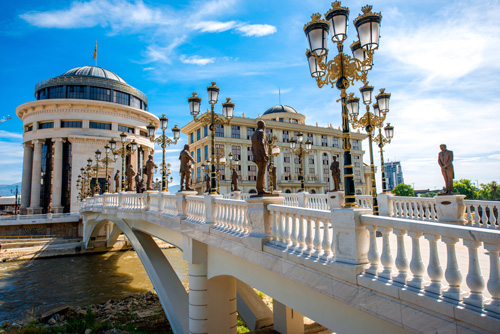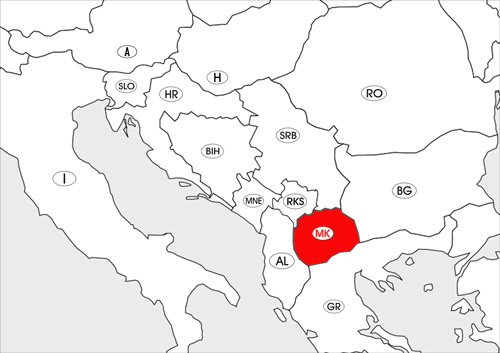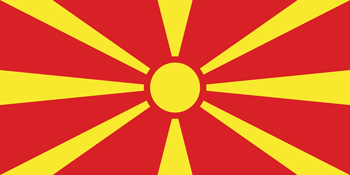
Customs procedures are procedures the Customs Administration performs over goods subject to customs control. The following are customs procedures:
(https://customs.gov.mk/index.php/en/biznis-zaednica-mk-2/carinski-postapki)
https://fez.gov.mk/wp-content/uploads/2018/01/law-in-tidz-eng.pdf
Technological–Industrial Development Zones (TIDZs) are centers in which highly productive clean manufacturing activities are concentrated and new technologies are developed.
North Macedonia offers additional incentives for development in the TIDZs, in addition to those normally associated with free economic zones.
Investors in TIDZs are entitled to personal and corporate income tax exemption for the first 10 years. Investors are exempt from payment of value added tax and customs duties for goods, raw materials, equipment and machines. Moreover, up to €500.000 can be granted as incentive towards building costs depending on the value of the investment and the number of employees. Land in a TIDZ in North Macedonia is available under long-term lease for a period of up to 99 years.
Other benefits include completed infrastructure that enables free connection to natural gas, water, electricity and access to a main international road network. Investors are also exempt from paying a fee for preparation of the construction site. Fast procedures for business activity registration are provided in TIDZ that further reduce the costs of setting up.
The Government pays special attention to production activities, activities from the IT area (software development, hardware assembling, digital recording, computer chips and the like), scientific research activity and new technologies with high environmental standards, for which additional benefits are envisaged in the TIDZs. Investors in TIDZs who operate in these areas are exempt from the liability for submission of a guarantee as collateral for any customs arrears.
https://investnorthmacedonia.gov.mk/stored/2021/04/Technological-Industrial-Development-Zones.pdf
The Republic of North Macedonia have one of the most attractive tax package in Europe, which simplify the tax system and stimulate successful companies to further improve operations and increase profitability.
|
TAX DUTIES |
TAX RATE |
DESCRIPTION |
|
PERSONAL INCOME TAX |
10 % |
|
|
PROFIT TAX- CORPORATE INCOME TAX |
10% |
|
|
VALUE ADDED TAX |
general tax rate of 18%
preferential tax rate of 5%.
|
Preferential tax rate of 5% is applied in the sales / import at: more on the link : http://www.ujp.gov.mk |
|
PROPERTY TAX |
0.1% – 0.2% |
|
|
INHARITANCE AND GIFT TAX |
2 – 3% or 4 – 5% |
2-3% for the tax payer in the 2nd order of succession and 4-5% for the tax payer in the 3rd order of succession or not related to the testator |
|
SALES TAX ON REAL ESTATE |
2 – 4% |
The amount of the rates is determined by a decision by the municipality and the Municipal Council of the city of Skopje. |
|
CUSTOM DUTIES |
between 5% – 20% |
|
|
INDUSTRIAL PRODUCTS |
3% |
For the equipment necessary to conduct the activities of the company, unused equipment and spare parts (except cars and office furniture) can be imported duty free. For companies in the Technological Industrial Development Zones, this includes used equipment as well. |
|
GENERAL AVERAGE |
5% |
10 YEAR TAX HOLIDAY – Investors in the free zones are entitled to a 10-year tax holiday for profit and corporate tax and 100% reduction of personal income tax for a period of up to 10 years. Investors are exempt from payment of value added tax for import and trade of goods in the free zones. Additionally, investors are exempt from payment of customs duties for equipment, machines and spare parts.
The land in the free zones in Republic of North Macedonia is available under long-term lease for a period of up to 99 years at concessionary prices.
Investors are exempt from paying utility taxes to the local municipality and fees for land building permits.
Free connection to natural gas, water and sewage network.
The Government may support growth of capital investments and income with a return of 10% of investment costs in new machines and equipment, or investment in buildings and land.
https://av.gov.mk/content/%D0%9E%D0%9F/OP_2021_ANG_.pdf
The Stabilization and Association Agreement between the European Union and the Republic of Macedonia (SAA) was signed on 9 April 2001 in Luxembourg and it entered into force on 1 April 2004 after a three-year process of ratification by all EU Member States and an agreement given by the European Parliament.
If the foreign legal entity (the income recipient) is a resident of the country by which the Republic of North Macedonia has concluded an Double Taxation Avoidance Treaty in relation to the income taxes and capital, then the tax rate for that income assessed in the Law should not exceed the tax rate which is applied for the income determined in the Agreement.
List of countries that has signed Agreement for avoiding double taxation
http://www.ujp.gov.mk/en/plakjanje/category/137
North Macedonia is a signatory of three multilateral Free Trade Agreements:
EFTA - Stabilization and Association Agreement with Switzerland, Norway, Iceland and Liechtenstein
CEFTA - CEFTA parties Albania, Bosnia and Herzegovina, North Macedonia, Moldova, Montenegro, Kosovo, and Serbia.
In addition to the multilateral, North Macedonia has also signed bilateral Free Trade Agreements with the following countries:
-Bilateral Free Trade Agreement with Turkey
-Bilateral Free Trade Agreement with Ukraine and now with the UK as well.
These agreements give North Macedonia duty free access to more than 650 million consumers. North Macedonia has also been a member of the World Trade Organization (WTO) since 2003.
https://investnorthmacedonia.gov.mk/ftas/
The Republic of North Macedonia is an independent state in southeastern Europe. The state is landlocked and is bordered by Serbia and Montenegro to the north, Greece to the south, Bulgaria to the east and Albania to the west. Documentation
Bills of Lading
No special regulations. As long as there are no payment or title (ownership) issues check if the goods can move with an express bill or on express release to avoid potential delays that may occur when shipping with the full marine bill of lading (ie cargo cannot be released until the original has been handed to the carrier in the importer’s country).
Authorised Economic Operator (AEO) Status
North Macedonia is a member of the Central European Free Trade Agreement (CEFTA) countries that are in the process of introducing and enhancing a Mutual Recognition Agreement (MRA) to provide a scheme for approving reliable and compliant traders with the benefit of awarding faster customs clearance. The status, similar to the EU Authorised Economic Operator (AEO) scheme with both a Safety & Security scheme AEOS and the Customs Simplification scheme AEOC. It is granted to companies which, over a period of time, have proven to be compliant partners of the customs authorities. Accredited parties are allowed to self-assess their customs entries and are granted expedited processing of their shipments with minimal checks.
Certificates of Origin
Certificates of Origin (COs) are no longer mandatory for EU shipments into North Macedonia, but a statement of origin must be clear on the invoice. A CO may still be specifically requested in the contract or under the terms of a letter of credit. COs are obtained from authorised Chambers of Commerce (see the EC Certificates of Origin and Arab-British Certificates of Origin topics). In the change to EU law (1 May 2016 — the Union Customs Code (UCC)), export origin for non-preference purposes is now subject to national standards and it may be necessary to obtain a declaration based on the rules of non-preference origin in the country of import. For consistency in the UK, British Chambers of Commerce (BCC) standards are still based on EU customs law.
When supplying Member State of the EU, use TRACES.
Chemicals:
As a signatory country to the Rotterdam Convention on the Prior Informed Consent Procedure for Certain Hazardous Chemicals and Pesticides in International Trade, shipments of designated chemical substances may only take place with the consent of the relevant import authority (the Designated National Authority (DNA)) by means of the prior informed consent (PIC) procedure.
Information about the characteristics of the chemical must be provided at the time of import, including the Material Safety Data Sheet (MSDS) or Certificate of Analysis; the HS code and all labelling requirements must be complied with.
For further details on EU chemical legislation, including REACH requirements, refer to the European Chemicals Agency (ECHA) website.
Cosmetics:
Exporters of consumer products may be required to provide a Certificate of Free Sale (CFS) certifying that their goods may lawfully be sold. Applications for the CFS issued by the Department of International Trade (DIT) Import Licensing Branch (ILB) are via the electronic Import Case Management System (ICMS), email: enquiries.ilb@trade.gov.uk.
Certificates of Conformity are required.
Electrical and electronic devices:
Telecommunication equipment requires an import permit that has been raised against a Certificate of Conformity.
Electrical goods must be accompanied by a Certificate of Conformity. The National Institute is an affiliate member of the European Committee for Electrotechnical Standardization (CENELEC).
Mercury: North Macedonia is one of the signatory countries that has ratified the Minamata Convention on Mercury, a global treaty to protect human health and the environment from the adverse effects of mercury. The aim is to phase out the importation of certain mercury-added goods by the end of 2020
Pharmaceutical and medicines (including medical devices):
Medicinal products must be registered and licensed prior to their importation.
An import permit issued by the Food and Veterinary Agency is required before veterinary medicines can be imported.
Regulations are in place concerning the registry and labelling requirement for medical products, which may also require a Health Certificate. A Health Certificate is also required for sample medical supplies.
CFSs are required for: general medical device(s); active implantable medical device(s) and in vitro diagnostic medical device(s) as well as a mixture of the above devices. In the UK, these CFSs are issued by the Medicines and Healthcare Products Regulatory Agency (MHRA).
A Certificate of Good Manufacturing Practice (GMP) is required to certify that the exporter’s manufacturing methods comply with the requirements of GMP under World Health Organization (WHO) guidelines.
Medicines and medical devices are to bear a label stating the name and address details of the manufacturer.
Plants and plant products:
Plants and some, but not all, plant products require a Phytosanitary Certificate. Phytosanitary controls are required for the import of certain plants, seeds, potatoes, seed potatoes, fruit and berries, plant propagation material products and peat that could present a phytosanitary risk. Further information on the International Plant Protection Convention can be found at www.ippc.int.
Health Certificates raised by an official authority in the exporter’s country are required for food and foodstuffs, including vegetables and fruit. The certificate is required even if only samples of food are being shipped.
RPA CFSs: Products for human consumption, eg food, health food supplements, sugar, soft drinks, tea, coffee and protein crops, require a CFS. The CFS for these goods is issued by the RPA in the UK.
The authority responsible for the inspection of foodstuffs imported is the Phytosanitary Directorate of the Ministry of Agriculture, Forestry and Water Economy.
Textiles and clothing:
Second-hand clothes should be accompanied by a Fumigation Certificate.
Wildlife and wildlife products (eg CITES):
Shipments of wildlife and wildlife products subject to the Convention on International Trade in Endangered Species of Wild Fauna and Flora (CITES) require an import permit.
General Declarations of Conformity:
A Declaration of Conformity confirming that goods to be imported conform to the applied national (Standardization Institute of the Republic of North Macedonia (ISRM)) and international (International Organization for Standardization (ISO)) standards are required for certain goods. CE marked products will be accepted as conforming to the required standards. ISRM is an affiliate member of the European Committee for Standardization (CEN) and many EU standards are harmonized with the North Macedonia equivalents.
One-stop-shop system for company registration within 4 hours.
The same laws apply for a foreigner as for a citizen of the Republic of North Macedonia
The same laws apply for a foreigner as for a citizen of the Republic of North Macedonia
The same laws apply for a foreigner as for a citizen of the Republic of North Macedonia
The Company Law regulates business activities and defines the types of companies, procedures and regulations for their establishment and operations. According to the amendment of the Company Law, the Central Register is an authorized body to perform all company registrations and the institution to maintain the Trade Register. As all foreign investors are granted the same rights and privileges as domestic companies, they are entitled to establish and operate all types of self-owned private companies or joint-stock companies.
By the Company Law, domestic and foreign individuals or companies can establish the following types of business entities:
One-stop-shop system
Central Register has implemented a One-Stop-Shop system through which company formation can normally be completed within four hours (2-3 business days in practice). The One-Stop-Shop system undertakes all registration procedures with various state bodies (including the provision of a tax ID no).
This significantly reduces administrative barriers and start-up costs. For more information visit the Central Registry office.

 |
|
| Amtssprache: | Mazedonisch, Albanisch |
| Hauptstadt: | Skopje |
| Staatsoberhaupt: | Stevo Pendarovski |
| Regierungschef: | Zoran Zaev |
| Fläche: | 25.7 km² |
| Einwohnerzahl: | 2.1 Millionen (2021) |
| Währung: | Denar (MKD) |
| Kfz-Kennzeichen: | NMK |
| Telefonvorwahl: | +389 |